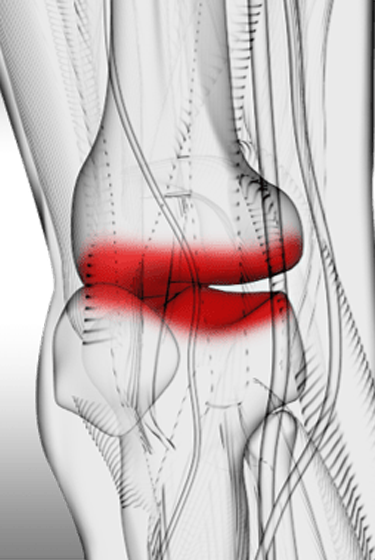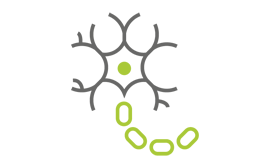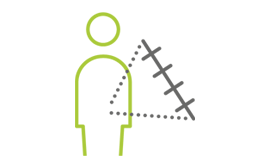
Osteoarthritis
More than simple “wear and tear”
Imagine not being able to use a knife and fork, pick up your children, get a good night’s sleep, or get dressed by yourself. These are just some of the things that osteoarthritis (OA) steals from millions of people around the world.
OA is not a normal part of ageing. It is a serious, debilitating and painful condition that can have a profound impact on almost every aspect of a person’s life.1,2 OA is a leading cause of disability worldwide1, and has been shown to significantly affect mental health, sleep, and the ability to perform everyday tasks.3,4,5,6 Current treatment options are limited and much more must be done to enable people living with OA to lead fuller, more independent lives.1
Understanding the complexity of OA
OA is a progressive, degenerative disease where the tissues in the joints break down over time.1,2 The most commonly affected joints include the knees, hands, hips, neck, and lower back.2 People with OA can experience a range of symptoms, including:2

Joint pain

Stiffness and swelling

Changes in joint movement

Joint weakness and instability
Having painful, inflamed, and swollen joints can significantly limit mobility and negatively impact quality of life:3
OA by the numbers
people suffer from OA globally8
people are diagnosed with OA each year9
increase of OA cases since 19908
OA is the most common joint disease in people aged 65 and over10
Osteoarthritis – the most common form of arthritis across the world
Over 500 million people suffer from osteoarthritis. Listen to Philip Conaghan, Professor of Musculoskeletal Medicine at the University of Leeds and Director of the NIHR Leeds Biomedical Research Centre, as he gives an insight into how this affects patients in their day-to-day live and why new therapy options are needed.The significance of knee osteoarthritis
The knee is the joint most commonly affected by OA, and over 360 million people worldwide are currently living with knee OA.8,11 The disease can affect one or both of the knees and is associated with pain that is often gradual at onset, but that worsens over time.12,13 For patients with knee OA, walking can be extremely challenging and pain is a daily burden.13 More must be done to help these patients lead freer and more active lives.
Patients need greater support and care
OA takes a significant toll on those affected, and at present, there are no effective methods for preventing OA or slowing its progression.1,2 Joint replacements are often necessary and treatments that address key symptoms are limited. Many patients experience side effects, a number of treatments can only be used short-term and 50% of knee OA patients taking pain medication report that their pain is not adequately controlled.1,13,14
OA affects millions of people around the world, and with today’s treatment options many are still living in pain. Every person with OA deserves access to more effective treatments and pain relief, as well as care that addresses the multi-faceted impact of the disease. At Grünenthal, we are committed to finding new and innovative approaches to help these individuals experience a World Free of Pain.
Nature Collection - Key scientific papers related to osteoarthritis
As part of our ongoing commitment to advancing research, education, and care for people with knee osteoarthritis Grünenthal has been working with Nature Reviews Rheumatology to launch a new collection of articles reviewing the latest research in osteoarthritis. The articles are available for free on the Nature Reviews Rheumatology website.
This sponsorship package, known as a Nature Collection, includes a selection of key scientific papers related to osteoarthritis from across the Nature Research portfolio, carefully curated by Nature’s expert editorial team with no influence from Grünenthal.
Nature Collection-
References
1 Hunter DJ & Bierma-Zeinstra S. Lancet. 2019;393:1745–59.
2 National Institute of Arthritis and Musculoskeletal and Skin Diseases – Osteoarthritis. (2022). Available at: https://www.niams.nih.gov/health-topics/osteoarthritis. [Accessed May 2023].
3 Conaghan, P. et al. (2015). Rheumatol. 54(2); 270–277.
4 Arthritis Foundation. Osteoarthritis and Sleep. Available at: https://www.arthritis.org/health-wellness/healthy-living/managing-pain/fatigue-sleep/osteoarthritis-and-sleep. [Accessed: May 2023].
5 Arthritis Foundation. Arthritis and Mental Health. Available at: https://www.arthritis.org/health-wellness/healthy-living/emotional-well-being/anxiety-depression/arthritis-and-mental-health. [Accessed: May 2023].
6 Kawano MM, et al. Acta Ortop Bras. 2015;23:307–10.
7 Vina ER, Kwoh CK. Curr Opin Rheumatol. 2018 Mar;30(2):160-167.
8 Long et al. Arthritis & Rheumatology. 2022;74(7); 1172–1183.
9 Institute for Health Metrics and Evaluation (IHME). Osteoarthritis – level 3 cause. Available at: https://www.healthdata.org/results/gbd_summaries/2019/osteoarthritis-level-3-cause. [Accessed May 2023].
10 ICD-11 for Mortality and Morbidity Statistics. (2022). Available at: https://icd.who.int/browse11/l-m/en#/http%3a%2f%2fid.who.int%2ficd%2fentity%2f558562409. [Accessed May 2023].
11 Global Health Data Exchange (GHDx). Global Burden of Disease Results Tool. 2019. Available at: http://ghdx.healthdata.org/gbd-results-tool. Accessed January 2022.
12 Arden N, et al. Atlas of Osteoarthritis. Second edition. 2018. ISBN: 978-1-910315-69-9 (eBook).
13 Hsu H, Siwiec RM. Knee Osteoarthritis. 2022 Sep 4. In: StatPearls [Internet]. Treasure Island (FL): StatPearls Publishing; 2023 Jan.
14 National Institute for Health and Care Excellence (NICE). Osteoarthritis in over 16s: diagnosis and management. NICE guideline NG226. 2022. Available at: https://www.nice.org.uk/guidance/ng226. Accessed February 2023.
Our therapeutic areas

Peripheral neuropathic pain

Chronic post-surgical pain

Chronic low back pain

If you are interested in collaborating with us...
Contact us
(M-N/A-HQ-07-23-0004)



